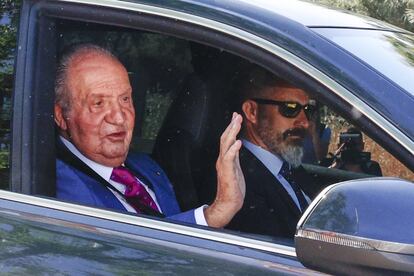UK charity accepts €10 million donation linked to disgraced former king of Spain
Britain’s Refugee Council has accepted funds from a recently-deceased Spanish historian. EL PAÍS has confirmed that the money mostly came from a trust with ties to Juan Carlos I, who abdicated in 2014 amid spending scandals


Britain’s Refugee Council, a discreet UK aid organization set up to support political refugees – has decided to accept a €10 million ($11 million) donation from the recently deceased Spanish historian Joaquín Romero Maura. The funds, however, mostly come from the JRM 2004 Trust, an opaque financial instrument created on the island of Jersey, a tax haven in the English Channel. This trust is linked to Spain’s emeritus king Juan Carlos I, as confirmed to EL PAÍS by an official source from the foundation.
The origin of these funds was investigated by prosecutors from Spain’s Supreme Court, to determine whether the money originally belonged to Juan Carlos I. The former Spanish monarch abdicated the throne in 2014 amid declining popularity due to his hunting trips and a raft of financial scandals. In August 2020 he fled Spain, where he was being investigated for financial irregularities. He now lives in the United Arab Emirates.
For the past six months, the charity’s directors weighed the decision over whether to accept or reject the donation. The ultimate decision to accept coincides with the former Spanish king’s planned visit to London, where he will have a private lunch with King Charles III next week. Afterwards, he plans to go to Spain to participate in training for a sailing competition in Sanxenxo, in the northwestern region of Galicia.
The donor and owner of the trust – Joaquín Romero Maura – died last June at the age of 81, at a senior home in Zaragoza, Spain. The historian – who held a PhD from Oxford University – was widowed and childless. He had been a confidante of the former Spanish king.
Romero Maura provided the NGO with a summary of all his assets. According to the Refugee Council, this included the balances of his Swiss bank accounts, two properties in London and another one in the French region of Périgord, all valued at a total of over £5 milllion ($6 million or €5.7 million). EL PAÍS has confirmed this after communicating with a relative of the deceased donor.
Upon being offered the donation, the charity launched an internal investigation of its own to determine the origin of the money. Tamsin Baxter, executive director of Fundraising and External Affairs at the Refugee Council – explained the process:
“Following robust due diligence by trustees, we have decided to accept the generous, legal gift of Joaquín Romero Maura. We are delighted that this gift will allow us to make a big difference in the lives of refugees and asylum seekers. We will take great care to ensure that the money is used to the best effect and lasts well into the future.”
The charity said that the donation of €10 million will be received annually and progressively, as established by the donor. The administrators of the trust will deliver €1 million each year deposited in accounts in Investec Bank, in Guernsey – another small island in the English Channel.
An old secret
Romero Maura, who also worked as a banker in London, guarded some of the Spanish monarch’s best-kept secrets. In 2004, the two men created a trust that was named using the historian’s initials, JRM, at number 50 La Colombière Street, in St Helier, the capital of the tiny tax haven in the English Channel. In his name, €14,923,604 were deposited (about $17.5 million), the origin of which has not been clarified. Romero Maura apparently never told his two brothers about his close relationship with the former king, nor about the existence of these funds, according to a source close to the family.
Ten different banks and administrators managed the funds without asking any questions about the origin of the money for two decades. The only beneficiary for eight years was Juan Carlos I, back when he was still the Spanish head of state, according to internal investigations that were unable to determine the origin of the fortune. The Zedra Trust Company – the last to manage the funds – decided to continue its management, but increased its fees due to the reputational risk it entailed.
The headquarters of the Refugee Council, whose Chief Executive is Enver Solomon, is located in a discreet three-story glass building in Stratford, East London, about 40 minutes by subway from the center of the British capital. Last November, when an EL PAÍS editor visited the charity, Baxter, the fundraising director, did not hide her concern about the origin of the money.
“We don’t know why he chose us. We have to [find out] who Mr. Romero Maura was, what the origin of the funds is and why he donated it to us. It’s an obligatory procedure when it comes to large amounts,” she said at the time. She also told this newspaper that the charity would make an independent decision, without consulting the British Commission of Charities, while noting that, in the past, the Refugee Council has rejected certain donations.
The Spanish Supreme Court’s prosecutors ultimately found no links between The JRM 2004 Trust and Juan Carlos I, “neither in its management nor in the ability to dispose of the funds.” And they stressed that the former head of state, who currently has emeritus status in his country, was never the beneficiary, nor is there evidence that he received any sum from the accounts.
Romero Maura dipped into the trust money on several occasions, based on the testimony of John Ruddy, the manager of the trust. In the trust’s first year of activity and until March 31, 2005, Romero Maura took out nearly $2.5 million from the JRM 2004 Trust, using it to purchase properties for himself and his wife in the UK and Switzerland. There are at least eight other transactions to his name, totalling $2.3 million between 2013 and 2016. However, no monies were transferred to or withdrawn by third parties. In its 22 years of existence, the trust has had very little activity, except for the payment of administrators’ fees.
After the recent death of the historian, it was Ruddy who communicated Romero Maura’s will to his two brothers, with whom the deceased had a good relationship. In it, he wrote that he had decided to donate everything to the British charity.
After the death of his wife, the former Oxford University professor sold his Swiss home and retired to a town in Périgord, in southwestern France. After suffering an illness, he entered a care facility in Zaragoza, the Spanish city where his brothers reside, where he passed away last June.
An unsolved mystery
The birth of The JRM 2004 trust remains a mystery. The judicial investigations never clarified the origin of the $17.5 million with which it was created. The monies came from the liquidation of two other trusts: Tartessos and Hereu, founded in 1995 and 1997 respectively, by Manuel Jaime de Prado and Colón de Carvajal, close friends of the king. Juan Carlos I was then the sole beneficiary of both financial instruments.
Part of the fortune came from Nadine Limited – a company based in the British Virgin Islands, with an account at the Chartered Bank in the name of Prado, according to documents consulted by this newspaper. This account supposedly collected donations from unidentified people who supported Juan Carlos I between the 1950s and 1970s. But the bulk of the funds is a donation in 1999 of $9 million, deposited by Simeon Saxe-Coburg-Ghota – known as Simeon of Bulgaria – from investment accounts at J.P. Morgan Switzerland. The purpose of both trusts was to support then-King Juan Carlos I if he were to be deposed by a coup, according to the trust’s administrator, John Ruddy.
In 2003 – almost 10 years after Juan Carlos I was listed as the sole beneficiary of that fortune – Romero Maura met with him and explained that the purpose of the Tartessos and Hereu trusts was no longer necessary, as the political situation in Spain had stabilized. However, he warned, if the public learned of the trusts’ existence, “it would be embarrassing for the monarchy.”
According to what Romero Mauro told the managers of the new trust, Juan Carlos I gave him all his funds “[because of] their long-standing friendship and the services provided by his family to the monarchy for generations.” He also authorized him to use it as he wished, “including giving it to other people who may need it, in the same circumstances that King Juan Carlos I himself [experienced] in the past.”
Along with various charitable associations, Romero Maura also included his wife, Gudrun Lawetz – now deceased – as a beneficiary. And, in 2017, he added the British Refugee Council to the list. Since then, the latter figures as the sole beneficiary, after the recent death of the historian.
Since 2005, the historian communicated to the trust’s administrators his desire that, after he and his wife passed away, the fortune be used for charitable purposes and social care, especially for children.
Tu suscripción se está usando en otro dispositivo
¿Quieres añadir otro usuario a tu suscripción?
Si continúas leyendo en este dispositivo, no se podrá leer en el otro.
FlechaTu suscripción se está usando en otro dispositivo y solo puedes acceder a EL PAÍS desde un dispositivo a la vez.
Si quieres compartir tu cuenta, cambia tu suscripción a la modalidad Premium, así podrás añadir otro usuario. Cada uno accederá con su propia cuenta de email, lo que os permitirá personalizar vuestra experiencia en EL PAÍS.
¿Tienes una suscripción de empresa? Accede aquí para contratar más cuentas.
En el caso de no saber quién está usando tu cuenta, te recomendamos cambiar tu contraseña aquí.
Si decides continuar compartiendo tu cuenta, este mensaje se mostrará en tu dispositivo y en el de la otra persona que está usando tu cuenta de forma indefinida, afectando a tu experiencia de lectura. Puedes consultar aquí los términos y condiciones de la suscripción digital.








































